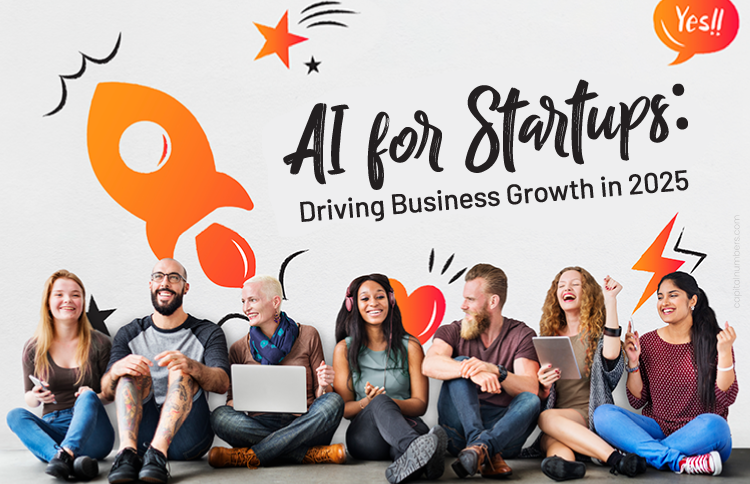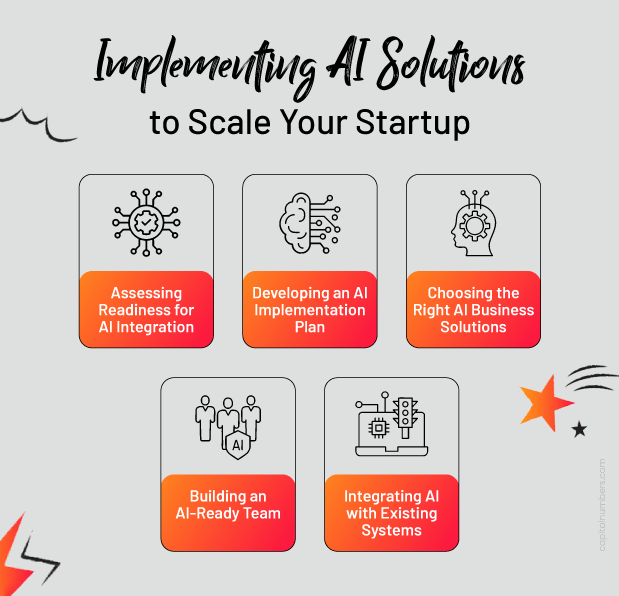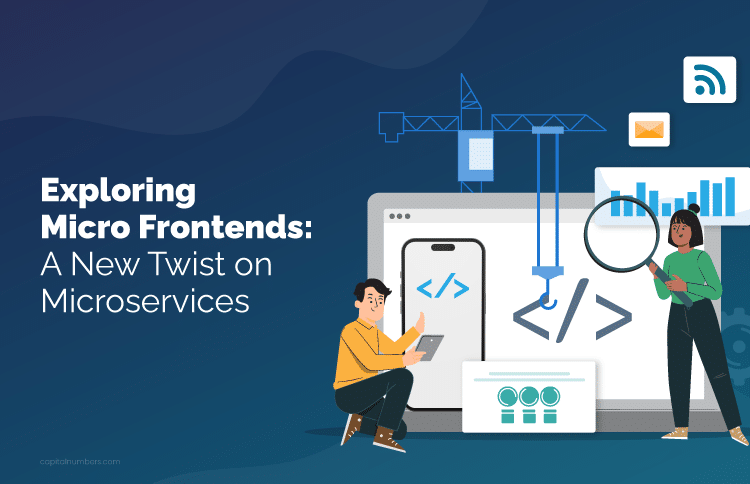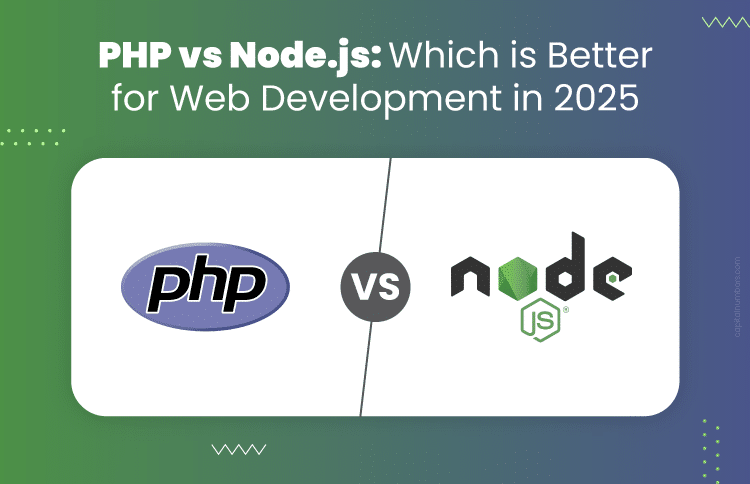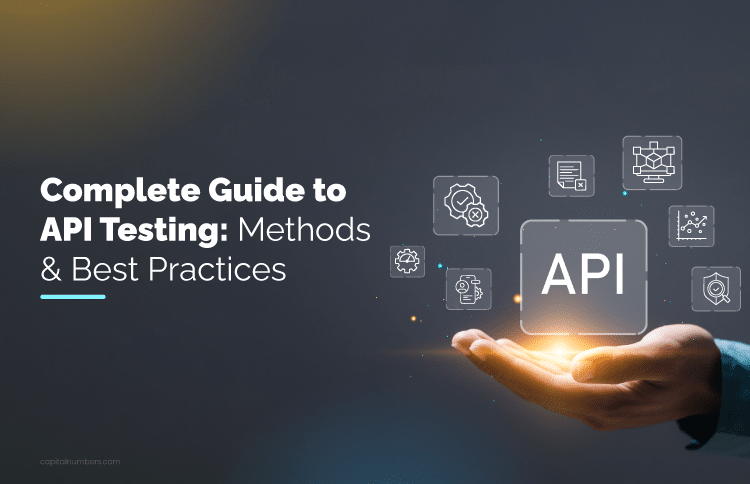AI for Startups: Driving Business Growth in 2025
Table of Contents
Let’s start with some eye-opening statistics about AI:
- The global artificial intelligence (AI) market is expected to reach $407 billion by the end of 2027. (Source: MarketsandMarkets)
- 83% of 333 million U.S. companies claim they will be using AI in their business strategies. (Source: Forbes)
- Around 40% of companies worldwide are actively utilizing AI in their operations, with another 42% exploring its adoption. (Source: DemandSage)
- AI investment forecast to approach $200 billion globally by 2025. (Source:goldmansachs)
These numbers clearly show that AI isn’t just the future—it’s the present. Businesses across the globe, from startups to established corporations, are embracing AI to streamline operations, make smarter decisions, and gain a competitive edge.
Are you ready to join the AI revolution? Keep reading to learn how AI and machine learning can transform your business.
Understanding AI for Startups: A Simple Guide for Business Owners
Artificial Intelligence might sound like something only big companies can afford, but it’s increasingly becoming a game-changer for startups too. This blog will help you understand what AI means, how it differs from other technologies, and how it can benefit your growing business.
What is AI for Startups?
AI, or Artificial Intelligence, refers to machines and software systems that can mimic human intelligence. They’re designed to learn from data, identify patterns, and make decisions or predictions, often faster and more accurately than humans. For startups, AI can automate routine tasks, solve complex problems, and unlock growth opportunities, allowing small businesses to compete with larger players.
How AI Differs From Other Startup Technologies
Many startups already use technologies like websites, apps, cloud computing, and CRM tools. However, AI stands out because it learns and adapts. Unlike static technologies, AI can improve over time as it analyzes more data. For example:
- A regular chatbot follows pre-set rules. An AI-powered chatbot, on the other hand, can learn from conversations, predict customer needs, and give smarter responses.
- Traditional software automates tasks, but AI uses data to make informed decisions, such as predicting future sales or spotting fraud before it happens.
In short, AI isn’t just a tool—it’s like having an intelligent assistant that grows alongside your business.
The Role of AI in Modern Startups
AI can integrate into almost every part of a startup’s operations, making businesses more efficient and innovative. Here’s how:
- Marketing: AI helps target the right audience through data analysis, running smarter ad campaigns, and predicting customer preferences.
- Sales: AI-powered tools can identify leads, suggest follow-ups, and even forecast sales trends.
- Data Analytics: AI enhances data analysis capabilities, providing startups with actionable insights to drive decision-making and strategy.
- Operations: AI simplifies inventory management, scheduling, and streamlining workflows.
- Customer Service: AI chatbots can handle customer inquiries 24/7, improving response times without hiring additional staff.
- Content Creation: AI tools assist in generating content for blogs, social media, and marketing materials, ensuring consistency and saving time.
The Benefits of AI Business Solutions for Startups
AI offers startups a range of benefits that can improve efficiency, cut costs, and enhance customer satisfaction. Here’s why AI should be on your radar:
- Enhanced Efficiency and Productivity: AI takes over repetitive and time-consuming tasks, freeing up your team to focus on more strategic work. For instance, AI can process large amounts of data, automate administrative duties, or handle customer support, saving hours of work every day.
- Cost Savings and Optimized Resources: AI tools help startups save money by reducing the need for manual labor, minimizing errors, and improving decision-making. For example, instead of hiring a full marketing team, AI tools can analyze customer data and run targeted campaigns on your behalf.
- Improved Customer Experience: AI helps you deliver more personalized services. From recommending products your customers are most likely to buy to providing instant support through chatbots, AI makes every interaction with your business feel more tailored and efficient.
Top AI Strategies for Startup Growth in 2025
In 2025, Artificial Intelligence continues to be a driving force behind startup success. For business owners, understanding how to implement AI strategies can unlock growth, improve efficiency, and give your business a competitive edge. Here’s a breakdown of how AI can fuel your startup’s growth, explained in simple terms.
1. Data-Driven Growth
Your startup generates tons of data every day—from customer interactions to sales numbers. But data alone doesn’t grow a business; it’s about how you use it. AI helps turn this raw data into valuable insights that guide smarter business decisions.
- Why data matters: Data reveals patterns about your customers, operations, and market trends. For example, your sales data can show which products are most popular or which customer segments to target.
- How AI helps: AI analyzes this data at lightning speed, identifying trends and opportunities you might miss. Instead of manually sifting through spreadsheets, AI tools provide you with clear insights, like “Product X sells better on weekends” or “Customer group Y is most likely to respond to this ad campaign.”
You May Also Read: Mastering the Art of Data Storytelling: A Complete Guide
2. AI-Powered Decision-Making
Running a startup means constantly making decisions—what products to launch, how much inventory to stock, or how to budget your resources. AI can support these decisions by offering real-time, data-driven recommendations.
- Real-time decision-making: AI can process large amounts of data instantly, helping you make decisions on the fly. For example, if you’re running low on inventory, AI can alert you and even suggest how much to reorder based on historical sales data.
- Examples in action:
- Inventory Management: AI predicts demand trends, ensuring you have just the right amount of stock—neither too much nor too little.
- Financial Forecasting: AI analyzes expenses, revenue, and market trends to help you create accurate budgets and identify areas to cut costs or invest more.
- Marketing: AI pinpoints the best times and platforms to launch ad campaigns for maximum impact.
3. AI Tools for Business Growth
There are countless AI tools available today, but not all of them will suit your business. Choosing the right AI tools is crucial for maximizing growth without wasting resources.
- Essential AI tools to consider:
- Chatbots: Automate customer support and save time. Tools like Zendex AI, My AskAI by HubSpot, Kommunicate can answer customer questions 24/7.
- Marketing Automation: AI-based marketing tools offered by Zapier, HubSpot, or Salesforce optimize campaign management, customer segmentation, and lead nurturing processes, enabling businesses to achieve higher engagement and conversion rates.
- Analytics Platforms: Tools like Zoho Analytics, Power BI, and Coefficient analyze complex data sets, generate insightful visualizations, and provide real-time reporting, enabling businesses to make data-driven decisions and optimize their business strategies.
- AI-Powered CRMs: Customer Relationship Management tools like Salesforce, HubSpot or Zoho help you track leads, manage customer relationships, and predict sales trends.
- How to choose the right tool:
- Focus on tools that solve a specific problem in your business (e.g., managing customer inquiries or improving ad performance).
- Look for user-friendly options that don’t require advanced technical skills.
- Consider scalability—make sure the tool can grow with your business.
Investing in the right AI tools can save you time, money, and effort while helping your business grow faster.
4. AI-Powered Customer Insights
Understanding your customers is key to startup success, and AI makes this easier than ever. By analyzing customer behavior and preferences, AI gives you the insights needed to meet their needs and exceed their expectations.
- How AI analyzes customer behavior: AI tracks how customers interact with your business—what products they view, what they buy, and how they respond to your marketing efforts.
- Examples of insights: AI might tell you:
- “Customers in their 20s are more likely to purchase Product A, while customers in their 40s prefer Product B.”
- “Customers who received personalized emails are 30% more likely to buy.”
- How to use these insights:
- Improve your product offerings: Focus on what your customers love.
- Personalize experiences: Tailor recommendations and promotions to individual customers, making them feel valued.
- Optimize marketing campaigns: Use customer data to create targeted ads that resonate with specific audiences.
AI ensures you’re not just guessing what your customers want—it gives you a clear understanding of their preferences, helping you build stronger relationships and boost satisfaction.
Implementing AI Solutions to Scale Your Startup
Scaling a startup can be a challenging process, but Artificial Intelligence can make it much easier and more efficient. The key to successfully using AI for growth lies in proper planning and execution. Here’s a step-by-step guide, explained in simple terms, to help you implement AI solutions and scale your business effectively.
1. Assessing Readiness for AI Integration
Before diving into AI, it’s important to evaluate if your startup is ready for it. AI works best when you have the right foundation in place.
- Evaluate your current technology setup: Check your existing tools, software, and data storage systems. For example, do you have a CRM system that stores customer data? Are your processes digitized? These are key components for AI to work effectively.
- Identify high-impact areas: Look for tasks or processes where AI can make a big difference. For instance:
- If your team spends too much time on repetitive tasks (like data entry or customer support), AI can automate them.
- If you’re struggling to analyze sales or customer data, AI can provide actionable insights.
Understanding where AI can bring the most value ensures that you invest in the right areas.
2. Developing an AI Implementation Plan
Having a solid plan is essential for successfully adopting AI. Without clear goals, it’s easy to lose focus or overspend.
- Set clear objectives: Think about what you want to achieve with AI. For example, do you want to improve efficiency, reduce costs, or increase customer satisfaction? Defining these goals will guide your AI strategy.
- Create a roadmap: Break your plan into smaller steps, with timelines and milestones. For instance:
- Step 1: Research AI tools that match your business needs.
- Step 2: Start with one pilot project, such as using an AI-powered chatbot for customer support.
- Step 3: Evaluate results, refine the solution, and scale up gradually.
A well-structured roadmap keeps everyone on track and ensures a smooth implementation process.
3. Choosing the Right AI Business Solutions
AI solutions come in many forms, so choosing the right one is crucial. The two most common types are Software-as-a-Service (SaaS) AI and custom AI solutions.
- SaaS AI: These are ready-made tools you can subscribe to, like AI chatbots, marketing platforms, or analytics tools. They are cost-effective and easy to set up, making them ideal for startups with limited budgets or technical expertise.
- Custom AI: These are tailored solutions built by AI/ML development companies specifically for your business. While they offer greater flexibility and precision, they are typically more expensive and require a longer development time.
- Key factors to consider when choosing AI solutions:
- Cost: Does the solution fit your budget? Consider subscription fees, setup costs, and potential savings.
- Scalability: Can the AI tool grow with your business as your needs evolve?
- Ease of integration: Can the tool work smoothly with your existing systems, like your CRM or e-commerce platform?
Starting with SaaS tools is often a smart choice for startups, as they’re quick to implement and cost-effective.
4. Building an AI-Ready Team
To make the most of AI, you’ll need a team that can manage and utilize these tools effectively.
- Key roles for AI implementation:
- Data Scientists: They analyze data and create AI models.
- AI Specialists: They set up and maintain AI tools.
- Project Managers: They ensure that the AI implementation stays on track and meets business goals.
- Upskill your current team: Train your existing employees on how to use AI tools through workshops, online courses, or vendor-provided training programs.
- Hire strategically: Partnering with an AI/ML development company can be a highly effective strategy. These companies bring specialized knowledge and experience that might be challenging to find in-house, especially for startups with limited budgets and time constraints.
By equipping your team with the right skills, you ensure long-term success with AI.
5. Integrating AI with Existing Systems
Integrating AI tools into your current workflows and technologies is a critical step. The smoother the integration, the more effective AI will be for your business.
- Ensure compatibility: Before purchasing an AI tool, confirm that it works well with your existing systems (e.g., your CRM, website, or accounting software).
- Start small: Begin with one or two AI solutions instead of overhauling all your processes at once.
- Address challenges early: Integration may come with hurdles, such as data compatibility issues or resistance from your team. Be prepared to troubleshoot problems like:
- Challenge: Employees feel unsure about using AI.
- Solution: Offer training and explain how AI will make their work easier, not replace them.
- Challenge: AI doesn’t fit perfectly with your processes.
- Solution: Customize settings or choose a different tool that better aligns with your needs.
You May Also Read: AI in 2025: Reshaping Healthcare, Finance, and Retail
Conclusion: AI Driving Startup Growth in 2025
In 2025, Artificial Intelligence (AI) is a key driver of startup growth. AI empowers startups by enhancing efficiency, reducing costs, and improving customer experiences across various operations such as marketing, sales, data analytics, and customer service. There are numerous ready-made AI tools available for different business functions. Additionally, custom AI solutions can be developed to address specific business needs.
Successful AI implementation involves assessing readiness, developing a strategic plan, selecting the right tools, building an AI-ready team, and seamlessly integrating AI with existing systems. Like any system, implementing AI comes with its own challenges. When done correctly, AI not only helps you keep up with the competition but also puts your startup ahead of the curve, paving the way for long-term growth and success.
Ready to Accelerate Your Startup with AI?
At Capital Numbers, we specialize in AI and Machine Learning development services tailored to your startup’s unique needs. Our expert team will help you harness the power of AI to enhance efficiency, reduce costs, and deliver exceptional customer experiences. Don’t let your startup fall behind—partner with us to stay ahead of the competition and achieve long-term success.

